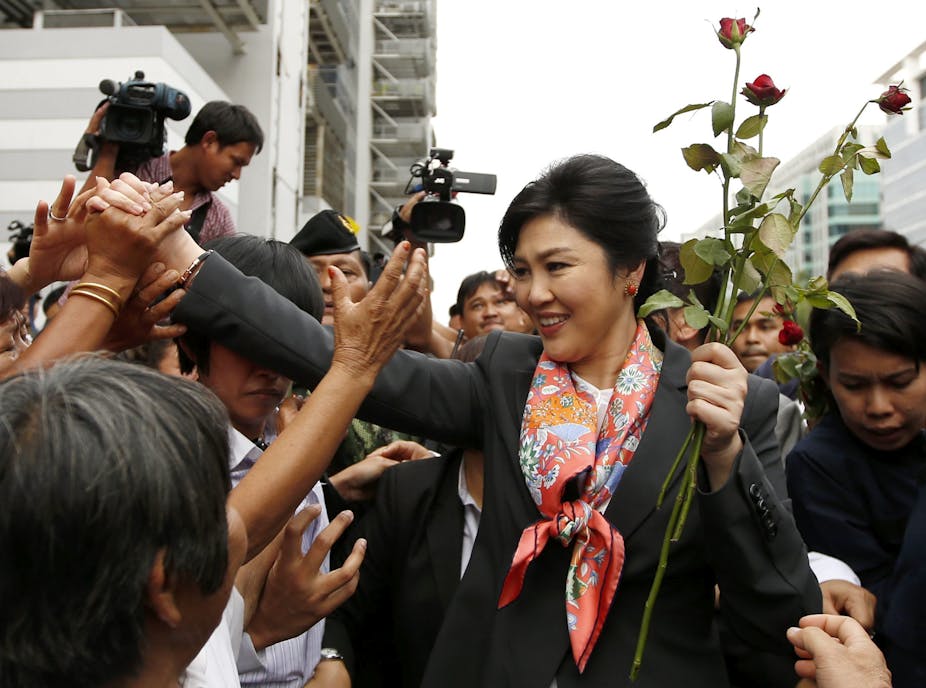Having faced down six months of sometimes violent street protests and avoided a military coup, Prime Minister Yingluck Shinawatra was yesterday brought down by Thailand’s Constitutional Court. The court decided that the transfer of an official amounted to a breach of the constitution. Another nine cabinet members involved in the transfer decision were also sent packing. None of them will be able to stand in any forthcoming election.
Being prime minister at the head of an elected government in Thailand has become a precarious existence. Yingluck is the fourth elected premier to be ousted since 2006. Each of those governments has been associated with Yingluck’s eldest brother, Thaksin.
Thaksin was elected three times. The Constitutional Court annulled one of his victories, with Thaksin eventually being ousted in a military coup in 2006.
In September 2008, Samak Sundaravej was disqualified as prime minister for receiving a small honorarium from a television cooking show. His successor, Somchai Wongsawat, lasted only a couple of months, with the Constitutional Court dissolving his party for electoral fraud.
Yingluck’s removal may yet result in further political conflict. The immediate future of the government, its supporters’ reaction and its opponents’ response will play out over the next days and weeks. We will certainly see efforts to bring down the current interim administration and further delay elections.
Politicised court shows its power
The court decision was based on a case that involved the transfer of a senior government official who had been strongly associated with the royalist opposition to Yingluck and her party before its 2011 election victory. He had also been one of the directors of security operations in which the military attacked “red shirt” supporters of Yingluck and her brother Thaksin.
In addition, the transfer was considered necessary in order to replace a political appointment as police chief. The replacement police chief was related to Thaksin’s former wife.
The opposition Democrat Party opposed these transfers, which led to a series of court cases and investigations. The Constitutional Court’s decision was that Yingluck had violated two sections of the constitution. The most significant breach was that Yingluck had used her position to interfere in the transfer of a permanent government official.
In most countries such transfers are normal. This is no longer the case in Thailand and, even though Yingluck had not proposed the transfer, the court decided she was responsible as she had signed the transfer. The court also considered that the transfer was executed “too hastily”, indicating a “hidden intention” that was “not in the national interest”.
Leaving aside the legal debates about this case, this latest judicial intervention is confirmation of the power of the judiciary and its remarkable politicisation.
In many jurisdictions, the courts are meant to act as an independent institution that underpins democracy. Even if this was the hope of some in Thailand, the political activism of the judiciary was ignited by the Thai monarch’s call for the judiciary to sort out a political impasse following elections boycotted by the Democrat Party and several other smaller parties in 2006. Since then, the judiciary, and the Constitutional Court in particular, have engaged in a judicial war against each of Thailand’s elected governments. Most strikingly, the court has even restricted the powers granted to parliament under the 2007 constitution.
Because the country’s judiciary is so highly politicised, decisions that defy legal logic have become the norm, with the judiciary consistently acting against elected governments. In essence, such decisions, sometimes based on flimsy accusations and charges by opposition activists, undermine the very democratic processes the judiciary is supposed to protect.

‘Judicial coup’ never in doubt
There was never any doubt that the Constitutional Court would oust Yingluck once the case was referred to it. Indeed, the court reached its decision – which took almost two hours to read – within a day of hearing the last of Yingluck’s evidence and witnesses. That is evidence enough that the court had its verdict before hearings were concluded.
Such obvious political bias also suggests an orchestration with those opposed to the government. The decision will reinforce views among the government’s supporters that Thailand’s political system is inherently supportive of the royalist elite. They see this elite as not just opposed to the will of the majority as expressed in elections but also as manipulating law and politics to protect their economic and political power.
The government has described the court’s decision as a “judicial coup” and its supporters will agree. Whether and to what extent the red shirts will mobilise in support of the teetering government remains to be seen.
For the government’s opponents, the court’s decision is vindication of their claims of the government’s corruption. The ouster of Yingluck has been one of the street protesters’ main demands.
This success will encourage them to push for the immediate ousting of the Pheu Thai government. They will also demand that elections be delayed while the opposition codifies new political and constitutional rules that will extinguish the chances of any Thaksin Shinawatra-associated government ever being elected.

